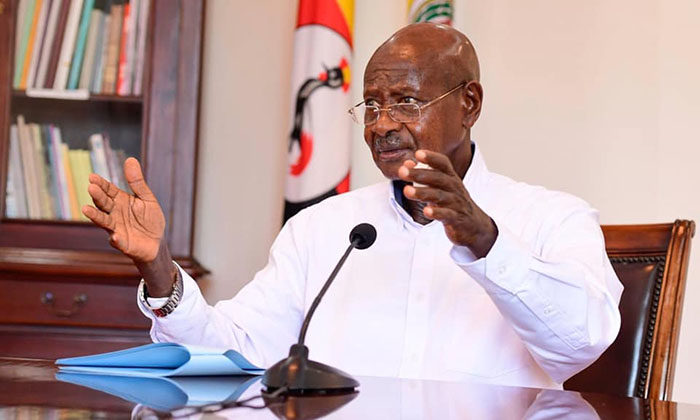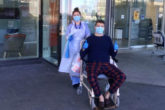
President Yoweri Kaguta Museveni . COURTESY PHOTO.
President Yoweri Kaguta Museveni on 30 March 2020 addressed Ugandans, announcing new restrictions on movement within the country in a bid to combat the spread of the coronavirus.
Here are 14 takeaways from his speech;
- The President prohibited all people to people movement – including those using their private vehicles, bodabodas, tuk-tuks etc.
“Some private car owners have turned their cars into taxis, transporting the two people we had permitted, assuming that they would be members of one’s family, when in fact they were passengers being charged the exorbitant fare of shillings 50,000/- from Kampala to Jinja. Hence, the problem we were trying to cure of allowing the mixing of people from different sources was not being addressed. Instead, it was taking new forms. valtrex online The people with private cars were now the new public transporters without licences and facilitating the dangerous mixing in the process,” he said.
The ban on privately owned passenger vehicles will take effect from 2200 hours (Ten O’clock), today, the 30th of March, 2020.
- President Museveni said shopping malls, arcades, hardware shops, which gather a lot of people to sell and buy non-food items are suspended for 14 days starting with the 1st of April, 2020.
- All the non-food shops (stores) were also ordered to close.
“Only food stores, stores selling agricultural products, veterinary products, detergents and pharmaceuticals should remain open. The Ministry of Health should work out SOPs for those stores. Many people should not be allowed to congregate there and form lines to buy. Home deliveries should, instead, be encouraged,” the President said.
- President Museveni said super-markets should remain open, adding that they are to have clear SOPs that restrict numbers that enter and leave the site at a given time and the handling of trolleys within the super-markets.
“A lot of people can be infected by handling the unsterilized trolleys within the super-markets,” he said.
- The President urged that established food markets in Kampala and the other towns are to remain open. However, he noted, two precautions must be observed. One, the distance of four metres to the front, to the left, to the right and to the rear ─ between seller and buyer and also seller and seller must be observed in all the markets. Secondly, the sellers must not go home during the 14 days. The President said they must arrange to stay nearby for that duration.
“That movement between workplace to home and back, is part of the problem. How are the people you left at home and how do you move to work if there is no public transport? It is that mixing that we want to freeze ─ between home, enroute and workplace. Be in only one place for 14 days and we see what is happening,” he said.
- The President said saloons, lodges and garages should be shut for 14 days from the 1st of April, 2020.
- Like farms, the President said government would like factories to keep producing because “that is the life-blood of the country.”
“The danger is in the workers going home and coming back. It is that daily movement that must be frozen. Let the factory owners arrange for the crucial employees to camp around the factory area for the 14 days. If they cannot do that, let them suspend production for 14 days,” he said.
- Construction sites were urged to continue if they are able to encamp their workers for 14 days. Otherwise, they should suspend construction for the 14 days, the President said.
- President Museveni said the ‘essential service’ providers hereby listed should continue to operate: the medical, veterinary, telephones, door-to-door delivery, Banks, Private Security companies, cleaning services, garbage collection, fire-brigade, petrol stations, water departments and some KCCA staff.
“URA should also not close business on account of not paying taxes in these 14 days,” he said. “These employers should, however, see whether they can encamp some staff near the workplace for the 14 days, which is the preferred way, or else get a special exemption from the RDC with the concurrence of the District Medical Officer.”
- The President said cargo transport by train, plane, lorry, pick-up, tuku-tukus, bodaboda and bicycle, within Uganda and between Uganda and the outside, must continue, but only with minimum numbers, technically needed as follows: Cargo ─ Air-craft ─ only the crew; Lorry ─ not more than 3 persons i.e. driver, tonne-boy plus one, etc., as will be directed by the Ministry of Transport, working with the National Task Force on the Corona virus.
- Gatherings of more than 5 persons were prohibited.
- Except for cargo planes, lorries, pick-ups and trains, starting with the 31st of March, 2020, at 1900 hours (Saa Moja ya Usiku), the President declared that there will be a curfew throughout the whole of Uganda.
“All other movements should stop. Let people stay in-doors in their homes except for the cargo-transporters. The exemption of cargo transporters does not apply to the bodabodas, tukutukus or bicycles in the curfew hours. Those should only operate during daylight hours,” he said.
- In order to deal with some unavoidable health issues like mothers in child birth or very sick people, the President said permission can be sought from the RDC to use private transport to take such a person to hospital.
“Government vehicles that do not belong to UPDF, Police, Prisons or UWA, will be pooled and deployed at the District Health Offices, including the divisions of Kampala, with their drivers, staying in tented compounds, ready to help in those health emergencies. Those vehicles will be under the command of the District Medical Officer,” President Museveni said.
“On account of this pandemic, some sectors of the economy are suffering, such as the tourism industry, the entertainment industry, the transport industry, etc. However, as I said earlier, new opportunities are emerging in this misfortune. You have seen how the demand for sanitizers, face masks, bicycles, etc., has stimulated new industrial opportunities,” he added.

